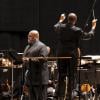
The search for the Oakland Symphony’s next music director was never about finding a replacement for Michael Morgan, the beloved conductor who was almost a civil servant for the city of Oakland. Rather, it was about continuing Morgan’s overarching vision for the organization, which, during his 30-year tenure, became an orchestra that truly reflected the entire diverse community it served.
In Kedrick Armstrong, the Oakland Symphony has found a musician who appears to be a perfect fit. A superb conductor whose musical tastes dovetail cleanly with the ensemble’s recent history, he has already debuted on the orchestra’s subscription series, leading a memorable performance in February of a new oratorio by composer Carlos Simon. (Armstrong had previously conducted a free civic performance on the steps of Oakland City Hall in August 2022.)
His first concert as music director, which took place on Friday, Oct. 18, at the Paramount Theatre, was more of a celebration of his arrival than perhaps he would have wanted. The new season opened not with music but with a lengthy testimonial from Oakland City Council President Nikki Fortunato Bas, who declared Oct. 18, 2024, Kedrick Armstrong Day. Despite the pomp, or maybe because of it, this was a stirring moment of recognition for a classical music organization.

And then there was the concert, which, in true Oakland Symphony style, mixed classical repertoire with an extensive tribute to Living Jazz, the educational organization that has spent 40 years bringing music to underserved youth, particularly through Jazz Camp West.
The program opener was by Julia Perry, a mid-20th-century Black composer who, to no one’s surprise, has been overlooked. Yet another American student of Nadia Boulanger, the great composition teacher, Perry wrote music that is strongly modernist and abstract, in a neoclassical vein that was common at that time. Her work, titled A Short Piece for Orchestra, was given its premiere in 1952 by the Turin Symphony under the baton of legendary Black conductor Dean Dixon. The opening trumpet rip introduces a section of unsettled alarm. Unexpectedly, a flute solo ushers in a restrained but lyrical melody, and the two moods alternate for the rest of the piece. It’s a strong composition from early in Perry’s career, well played here.
The real focus of the program’s first half was on three new jazz works commissioned especially for this concert. The first of these, by drummer and Jazz Camp West Artistic Director Allison Miller, was Valley of the Giants, dedicated to Eddie Marshall (1938–2011), a famed drummer who ended his career living in Oakland and also taught at Jazz Camp West. The orchestral arrangement was by Miller’s longtime collaborator, Todd Sickafoose, and featured her on drums and Dayna Stephens on tenor saxophone.

Miller’s ambitious work begins by evoking the redwood trees under which Jazz Camp West takes place. An opening cymbal roll leads into a woodsy intro with piano, vibes, and of course, xylophone. Then a warm, embracing string melody takes over. You wish it would stay, but it gets transformed a little later in the piece. The fleet passagework in Stephens’s first solo and a later bebop section paint Marshall’s effusive, joyous personality as clearly as if we knew him.
Throughout the performance, Miller was incredibly inventive in using an expanded drum set to find evocative timbres. Everything was light and dry and restrained, from single snare taps to rhythms beaten on drum frames to the atmospheric ringing of bells. Armstrong and the orchestra were fully involved — no long-held “football notes” here — and the piece emerged triumphant.
Meklit, the globally recognized Ethio-jazz singer-songwriter, contributed three recent songs in new orchestrations by bassist Sam Bevan: “Ethio Blue,” “My Gold,” and most memorably, “Stars in a Wide Field,” dedicated to her recently deceased brother. This last song is structured around local proverbs from a region in northern Ethiopia, and they are striking when sung to Meklit’s beautiful melody. The title comes from the saying that becomes the refrain: Stars are “the roasted grains, strewn in a wide field.”

John Santos, the phenomenal Oakland-based percussionist, offered Un Levantamiento (An uprising), which he co-arranged with Saul Sierra. With vocalist Maria Cora speaking a sort of prologue and Pedro José Pastrana doing an inspired job on Puerto Rican cuatro, the work was intended to capture the indomitable spirit of the Puerto Rican people. The orchestra musicians sounded great on this piece, which really involved them, polyrhythms spreading through the instrumental sections.
The second half of the concert was dedicated to Carl Nielsen’s Symphony No. 4 (“The Inextinguishable”). On a day when a fire started in the Oakland hills next to the 580 Freeway, it was especially appropriate for Armstrong to remind us that Nielsen’s symphony — which, despite its title, isn’t formally programmatic — is in general about love as an elemental force. The conductor said he chose the piece to represent the tenacious, unrelenting drive of the people of Oakland. Perhaps it was also meant to connect with Santos’s composition.
Nielsen’s symphony was bursting with energy and drive as Armstrong led an unflagging performance that lifted the spirit. The orchestra certainly seemed inspired by its new leader, bringing the work to a shimmering climax, with two timpanists banging out the rhythm of the main theme and the brass coming to the fore. It was exhilarating.




